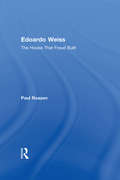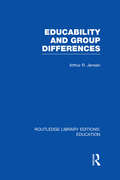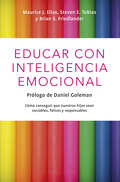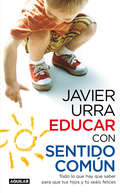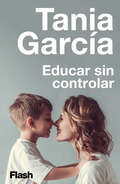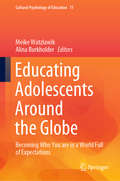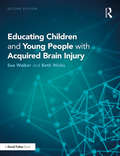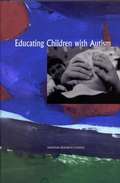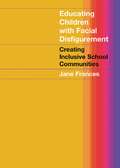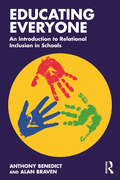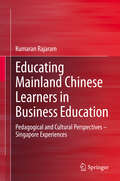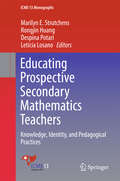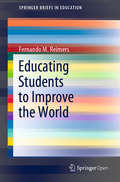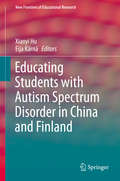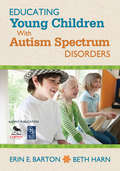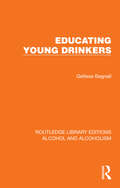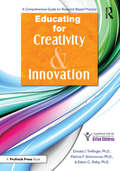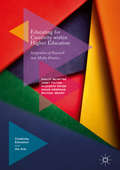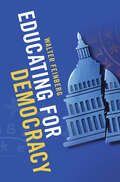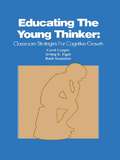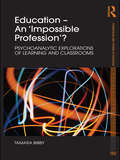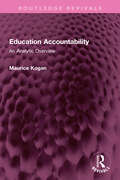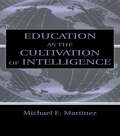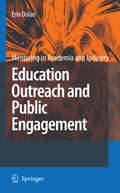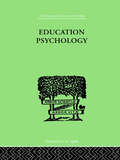- Table View
- List View
Edoardo Weiss: The House that Freud Built
by Paul RoazenEdoardo Weiss (1889-1970) was a favored disciple of Freud and is acknowledged as the founder of psychoanalysis in Italy. Although he was the author of six books and over a hundred professional papers, he has remained a shadowy figure. In this volume, Paul Roazen provides a definitive portrait of this notable individual. Based on his extensive interviews with Weiss, Roazen evaluates the significance of Weiss's own contribution to psychoanalytic thought and practice and presents a fascinating picture of the reception given to Freud's thought in Italy.
Educability and Group Differences (Routledge Library Editions: Education)
by Arthur JensenJensen is a controversial figure, largely for his conclusions based on his and other research regarding the causes of race based differences in intelligence and in this book he develops more fully the argument he formulated in his controversial Harvard Education Review article ‘How Much Can We Boost IQ and Scholastic Achievement?’. In a wide-ranging survey of the evidence he argues that measured IQ reveals a strong hereditary component and he argues that the system of education which assumes an almost wholly environmentalist view of the causes of group differences capitalizes on a relatively narrow category of human abilities. Since its original publication the controversy surrounding Jensen’s ideas has continued as successive generations of psychologists, scientists and policy-makers have grappled with the same issues.
Educar con inteligencia emocional
by Maurice J. Elias Steven E. Tobias y Brian S. FriedlanderSugerencias, actividades y consejos prácticos que ayudarán a los padres a utilizar sus emociones del modo más positivo. En las páginas de este libro, los padres aprenderán a comunicarse con sus hijos en el nivel más profundo y gratificante, y a asistirles a la hora de sortear con éxito el intrincado laberinto de las relaciones con los demás. Tomando los cinco principios básicos del gran éxito de Daniel Goleman, Inteligencia emocional, los autores explican cómo aplicarlo para obtener buenos resultados en la educación de los niños. Con este fin ofrecen sugerencias, actividades y consejos prácticos, que ayudarán a los padres a utilizar sus emociones del modo más positivo en asuntos tan cotidianos como la rivalidad entre hermanos, conflictos con los amigos, situaciones escolares diversas o la presión ejercida por los compañeros.
Educar con sentido común: Todo lo que hay que saber para que tus hijos y tú seáis felices
by Javier UrraEducar con sentido común te enseña todo lo que hay que saber desde que tu hijo nace hasta la juventud, pasando por la adolescencia, esa etapa tan conflictiva. Una guía práctica y completa para educar bien, con criterio. La llegada de los hijos plantea para los futuros padres miedos e inseguridades. A los temores propios de los primerizos «¿qué cuidados hay que seguir durante el embarazo?», «¿qué nombre le pondremos?», «¿por qué llora?», se une la eterna cuestión: «¿lo estamos haciendo bien?». Deja de temer por todo, por la comida, por su rendimiento escolar, porque es muy callado, porque está siempre jugando a la consola, en Internet o con el móvil, porque empieza a salir los fines de semana... Ha llegado el momento de aprender a educar a tus hijos con sentido común. Javier Urra, psicólogo y pedagogo terapeuta, te da las claves necesarias para formar a tus hijos con inteligencia, equilibrio emocional yvalores, y describe de manera sencilla sus necesidades en cada momento: salud, conducta, miedos, juegos, sexualidad; además te ofrece criterios útiles para cada una de las etapas de su desarrollo, con la opinión de profesionales del sistema educativo.
Educar sin controlar
by Tania GarcíaUna guía emocional para educar a nuestros hijos con respeto y empatía por la autora superventas de Educar sin perder los nervios. Tania García, una de las mayores especialistas internacionales en Pedagogía y creadora de la Educación Real®, analiza las relaciones entre padres e hijos para ofrecer una guía para una crianza respetuosa y consciente. En este texto, procedente del aclamado libro Educar sin perder los nervios, descubre a los lectores las claves para huir del control emocional que ejercemos sobre los hijos. Abogando siempre por el respecto a los derechos fundamentales de los niños, sus decisiones y su desarrollo, acompaña sus explicaciones con ejemplos concretos de tantos años de acompañamiento a familias. Un texto más necesario que nunca para desterrar los mitos sociales relacionados con la infancia y generar una sociedad más justa, más empática y más feliz. «Como todo en la vida, lo importante no es el destino, sino el viaje; por tanto, cada etapa de nuestra existencia cuenta, cada año de la infancia y adolescencia de nuestros hijos es importante para el presente y para el futuro. Sin embargo, nunca podrán disfrutar del trayecto si son controlados, manipulados y dirigidos».
Educating Adolescents Around the Globe: Becoming Who You Are in a World Full of Expectations (Cultural Psychology of Education #11)
by Meike Watzlawik Alina BurkholderBy traveling to different parts of the world, this book provides a multidisciplinary perspective on the current state of adolescent education and demonstrates how education systems are formed by and closely tied to culture. After establishing a theoretical background, the book delves into the particulars of adolescent education and its associated challenges in six countries (India, Kenya, Germany, Brazil, Japan, and Denmark). In tandem with the discussion of institutions, the stories of those who are all too often underserved or left behind are told. Despite the diversity of each education system, the investigation reveals several unifying themes that transcend the specific contexts. The lessons from each example are woven together to demonstrate how the individualized needs of students can best be met, in a vision for the future of educating adolescents."
Educating Children and Young People with Acquired Brain Injury
by Sue Walker Beth WicksEducating Children with Acquired Brain Injury is an authoritative resource book on the effects of brain injury on young people and how educators can understand and support their needs. This new edition has been updated to reflect changes to legislation and practice relating to special educational needs and will enable you to maximise the learning opportunities for young people with acquired brain injury (ABI). Considering key areas in special educational needs such as communication, interaction, cognition, sensory and physical needs, the book provides information on the multifaceted needs of children and young people with ABI and how these needs can be met. This book will help you to: Understand the difficulties that young people with ABI experience Support these students by using appropriate strategies to help their learning Understand and address the social and emotional difficulties experienced by these students Work in partnership with families and other professionals Understand information from other professionals by reference to a glossary of terms Access further useful information from relevant resources and organisations Written for SENCOs, teachers, teaching assistants, educational psychologists and other education professionals across all settings, Educating Children with Acquired Brain Injury is full of useful information and advice for parents and other family members, clinical and behavioural psychologists, therapists and support workers involved with children and young people with ABI.
Educating Children with Autism
by National Research Council Staff Committee on Educational Inverventions for Children AutismAutism is a word most of us are familiar with. But do we really know what it means? Children with autism are challenged by the most essential human behaviors. They have difficulty interacting with other people-often failing to see people as people rather than simply objects in their environment. They cannot easily communicate ideas and feelings, have great trouble imagining what others think or feel, and in some cases spend their lives speechless. They frequently find it hard to make friends or even bond with family members. Their behavior can seem bizarre. Education is the primary form of treatment for this mysterious condition. This means that we place important responsibilities on schools, teachers and children's parents, as well as the other professionals who work with children with autism. With the passage of the Individuals with Disabilities Education Act of 1975, we accepted responsibility for educating children who face special challenges like autism. While we have since amassed a substantial body of research, researchers have not adequately communicated with one another, and their findings have not been integrated into a proven curriculum. Educating Children with Autism outlines an interdisciplinary approach to education for children with autism. The committee explores what makes education effective for the child with autism and identifies specific characteristics of programs that work. Recommendations are offered for choosing educational content and strategies, introducing interaction with other children, and other key areas. This book examines some fundamental issues, including: How children's specific diagnoses should affect educational assessment and planning How we can support the families of children with autism Features of effective instructional and comprehensive programs and strategies How we can better prepare teachers, school staffs, professionals, and parents to educate children with autism What policies at the federal, state, and local levels will best ensure appropriate education, examining strategies and resources needed to address the rights of children with autism to appropriate education.Children with autism present educators with one of their most difficult challenges. Through a comprehensive examination of the scientific knowledge underlying educational practices, programs, and strategies, Educating Children with Autism presents valuable information for parents, administrators, advocates, researchers, and policy makers.
Educating Children with Facial Disfigurement: Creating Inclusive School Communities
by Jane FrancesChildren and young people who are visibly different face significant social and psychological challenges at school. Educating Children with Facial Disfigurement demystifies a difficult and delicate subject. Teachers and others working in education can use this book to acquire a better knowledge of the issues involved, as well as the confidence to handle sensitive issues and foster inclusive attitudes both in and out of the classroom. There are many causes of facial disfigurement - birthmarks, cleft lip and palate, burns, scars and serious skin conditions - so it is essential that all schools know about the issues arising from visible difference. Jane Francis examines many of these issues and demonstrates in a practical way how to deal with: * staring, curiosity and questions, teasing, name-calling and bullying* medical needs, special educational needs and related issues* creating inclusive school communities* self-perception and self-expression* career ideas, work experience and social skills for life. With illustrative case studies, lesson ideas and references to useful resources, this book will be of particular relevance to teachers with responsibility for special educational needs or pastoral care.
Educating Everyone: An Introduction to Relational Inclusion in Schools
by Anthony Benedict Alan BravenDrawing on the latest neuroscientific research and rooted in good practice, Educating Everyone presents the concept of Relational Inclusion, encouraging schools to reconsider their traditional perspectives on mental health and behaviour.The authors pose thought-provoking questions about longstanding conventional approaches to behaviour management in schools that have remained largely unchanged since the inception of compulsory state education. They present a range of strategies that extend beyond the needs of individuals with complex requirements who are often isolated as a result of the misguided concept that they can be "taught" to conform. Relational Inclusion is advocated as an inclusive approach that can benefit all children and adults, fostering comprehension of the underlying causes behind behavioural challenges. This book provides an essential framework for responding to students' behaviour that has been tried and tested in real classrooms. Schools play a pivotal role in teaching these essential skills and attitudes, and this accessible resource provides educators with valuable insights and practical strategies for creating a nurturing and supportive environment within school settings. It will appeal to educationalists across the educational sector, including headteachers and policy leaders as well as behaviour leads, classroom teachers, support staff, and anyone who works with children and young people.
Educating Mainland Chinese Learners in Business Education: Pedagogical and Cultural Perspectives – Singapore Experiences
by Kumaran RajaramThis book presents strategies and practices for facilitating effective learning for mainland Chinese students in western based education – regarding e.g. the choice of instructional techniques, attention to students’ cultural dislocation aspects, comfort, familiarity, and ease of knowledge transfer. It embeds innovativeness at a conceptual level, and argues for a holistic and “engaged” approach to learning effectiveness for mainland Chinese students.
Educating Prospective Secondary Mathematics Teachers: Knowledge, Identity, And Pedagogical Practices (ICME-13 Monographs)
by Marilyn E. Strutchens Rongjin Huang Leticia Losano Despina PotariThis book highlights innovative approaches to preparing secondary mathematics teachers. Based on empirical findings gathered in several countries on five continents, it provides a wealth of best practices for preparing secondary mathematics teachers, and discusses issues related to their professional and personal growth, such as identity, content knowledge, and pedagogical content knowledge which also includes knowledge of integrating technology into teaching and learning mathematics. Divided into four parts, the book focuses on field experiences, technologies, tools and resources, teacher knowledge, and teacher professional identities. Some of the main threads running through the book are: the importance of university and school partners working together to ensure preservice secondary mathematics teacher’ success in developing pedagogical strategies that lead toward students’ mathematical engagement and achievement; the critical need for preservice secondary mathematics teachers to develop strong content knowledge and pedagogical content knowledge; and the importance of providing opportunities, during pre-service education, for developing prospective teachers ´professional identities.
Educating Students to Improve the World (SpringerBriefs in Education)
by Fernando M. ReimersThis open access book addresses how to help students find purpose in a rapidly changing world. In a probing and visionary analysis of the field of global education Fernando Reimers explains how to lead the transformation of schools and school systems in order to more effectively prepare students to address today’s’ most urgent challenges and to invent a better future. Offering a comprehensive and multidimensional framework for designing and implementing a global education program that combines cultural, psychological, professional, institutional and political perspectives the book integrates an extensive body of empirical literature on the practice of global education. It discusses several global citizenship curricula that have been adopted by schools and school networks, and ties them into an approach to lead school change into the uncharted territory of the future. Given its scope, the book will help teachers, school and district leaders tackle the change management needed in order to introduce global education, and more generally increase the relevancy of education. In addition, the book offers a “bridge” for more productive collaboration and communication between those who lead the process of educational change, and those who study and theorize this important work.At a time when the urgency of our shared global challenges calls for more understanding and collaboration and when the rapid transformation of societies requires that we help students develop a clear sense of relevancy and purpose, this book offers a way to pursue deep and sustainable change in instruction and school culture, so that students learn that nothing human is foreign and that they can find meaning in lives aligned with audacious purposes to make the world better.
Educating Students with Autism Spectrum Disorder in China and Finland (New Frontiers of Educational Research)
by Xiaoyi Hu Eija KärnäThis book addresses the difficult challenges that children with autism present educators. By comprehensively examining the scientific knowledge underlying educational practices, programs and strategies in China and Finland, it provides valuable information for parents, administrators, researchers, and policy makers. This book examines the following fundamental issues related to the education of children with autism: •How children's specific diagnoses should affect educational assessment and planning •How we can support the families of children with autism •Features of effective instructional and comprehensive programs and strategies •How we can better prepare teachers, school staff, professionals and parents when it comes to educating children with autism •What policies at the national and local levels will best ensure appropriate education, examining strategies and resources needed to address the rights of children with autism to appropriate education
Educating Young Children With Autism Spectrum Disorders
by Beth Harn Erin E. BartonEverything you need to know to educate students with autism Every 20 minutes, another child is diagnosed with autism. Are you ready to meet this growing educational challenge? This authoritative guide is for practitioners - early interventionists, teachers, school counselors, psychologists - who are committed to the education and dignity of students with autism in preschool and elementary grades. Each chapter focuses on a critical issue and offers solutions, including: Improving communication, social, generalization and self-management skills Designing instruction, intervention, and assessment Including families in developing goals and interventions Using students’ special interests to deliver instruction Understanding and preventing challenging behavior Evaluating practices to promote successful outcomes for students, families and practitioners
Educating Young Drinkers (Routledge Library Editions: Alcohol and Alcoholism)
by Gellisse BagnallYoung people are regarded as vulnerable by the media – often exaggeratedly so. In the early 1990s they had become the focus of public concern regarding alcohol misuse. But attempts to educate teenagers into using alcohol sensibly have often been counterproductive. What kind of approach should alcohol education take to produce effective results? Originally published in 1991, Educating Young Drinkers outlines the reasons for the lack of success in previous experiments in alcohol education at the time. It focuses on an activity-based primary intervention with young people as a possible solution. With the active involvement of school teachers, Gellisse Bagnall had developed a relevant and pupil-oriented programme designed for easy classroom use. The evaluation of the results of this experiment demonstrated that non-didactic alcohol education can be made to work. In emphasizing the political and theoretical assumptions made in devising health education policies, Educating Young Drinkers was directly relevant to social scientists within alcohol and/or health education, as well as to policy makers. It would also be a valuable source of information for teachers and all those working with young people.
Educating for Creativity and Innovation: A Comprehensive Guide for Research-Based Practice
by Donald J. Treffinger Edwin C. Selby Patricia F. SchoonoverToday, more than ever before, we must all be able to think creatively, manage change, and solve complex, open-ended problems. Education today is different in its structure and practice than it was in any previous generation, not just because of the impact of technology and the Internet, but also because, across the lifespan, every person studies, works, and plays in a global community that was previously unknown to most generations. Although organizations worldwide recognize that their success both now and in the future depends on a workforce capable of effective thinking, problem solving, and innovation, educational practice still lags behind our knowledge in these areas. Educating for Creativity and Innovation is a powerful resource to close the gap between research and practice and to promote understanding and effective practice relating to creativity and innovation. In short, this is a book whose time is now!
Educating for Creativity within Higher Education: Integration of Research into Media Practice (Creativity, Education and the Arts)
by Susan Kerrigan Phillip McIntyre Janet Fulton Elizabeth Paton Michael MeanyThis book provides innovative insights into how creativity can be taught within higher education. Preparing students for employment in a dynamic set of global creative industries requires those students to not only be resilient and entrepreneurial, but also to be locally focused while being globally aware. Therefore it is imperative that they acquire a thorough understanding of creative processes and practice as they try to keep pace with worldwide digital trends. As the creation of media messages is a fundamental aspect of global creative industries, and that numerous concerns practitioners face are based upon a certain understanding of creativity, the authors propose an exploration of what creativity is in terms of research, and then apply it pedagogically. Drawing on extensive empirical research, the authors pose the thought-provoking question of whether creativity can be taught. This volume will be of interest to both students and scholars of creativity and higher education as well as to creatively-based practitioners more widely.
Educating for Democracy
by Walter FeinbergIn our world of unceasing turmoil, an educated citizenry is the first and strongest line of defence for democratic renewal. Educating for Democracy shows how students can prepare for the responsibilities of 'the most important office in a democracy' – that of a citizen. Education can provide students with the dispositions and skills needed to exercise their role judiciously and responsibly, as a patriot who cares about democracy and as a custodian who cares for democracy. These two aspects of caring call for curriculum-wide reform. The outcome of this reform is a patriot who serves as custodian of democratic culture, where commitment and competence, heart and mind, love and intellect, are brought together for the sake of democratic renewal. While nations, as both instruments and proximal objects of care, have an important role to play in this renewal, the ultimate aim is the care and cultivation of a democratic culture.
Educating the Young Thinker: Classroom Strategies for Cognitive Growth
by C. Copple I. E. Sigel R. SaundersPublished in the year 1984, Educating the Young Thinker is a valuable contribution to the field of Cognitive Psychology.
Education - An 'Impossible Profession'?: Psychoanalytic Explorations of Learning and Classrooms (Foundations and Futures of Education)
by Tamara BibbyIn classrooms and lectures we learn not only about academic topics but also about ourselves, our peers and how people and ideas interact. Education – An Impossible Profession extends the ways in which we might think about these processes by offering a refreshing reconsideration of key educational experiences including those of: being judged and assessed, both formally and informally adapting to different groups for different purposes struggling to think under pressure learning to recognise and adapt to the expectations of others. This book brings psychoanalysis to new audiences, graphically illustrating its importance to understandings of teaching, learning and classrooms. Drawing on the author’s original research, it considers the classroom context, including policy demands and professional pressures, and the complexity of peer and pedagogic relationships and interactions asking how these might be being experienced and what implications such experiences might have for learners and teachers. The discussions will be of interest not only to teachers, leading-learners and teacher-educators, but also to individuals interested in education policy, professional practice and theories of education.
Education Accountability: An Analytic Overview (Routledge Revivals)
by Maurice KoganFirst published in 1986, Education Accountability is a critique of writing on accountability and evaluation with respect to education and its various stakeholders. The author applies frameworks drawn from the theory of knowledge, social psychology and social policy, demonstrating how different assumptions about the nature of schooling, curriculum control and development can give rise to various forms of political control, of which education accountability is a special and important case. This sharp book will be valuable reading for all advanced students of education, whether interested in curriculum or educational administration, as well as to students of political science, social policy and evaluation studies, teacher trainers, administrators and educational researchers.
Education As the Cultivation of Intelligence (Educational Psychology Series)
by Michael E. MartinezMartinez defines intelligence from a cognitive perspective as a repertoire of those skills, strategies, and knowledge structures that are most instrumental in human effectiveness. He posits that in today's complex, fast-paced, technologically dense, and information-rich society, intelligence is the supreme human resource. The current social context not only demands intelligence, but rewards it economically, psychically, and in other ways. His central argument in this book is this: The intellectual abilities that are crucial to modern life, including economic viability and effectiveness in daily living, correspond to the cognitive functions that are reasonably called intelligence; these intellectual abilities are learnable; we now know enough about the structure and mechanisms of intelligent thought and behavior to teach them directly. Martinez explicates his argument and provides research-based evidence to support his claim.
Education Outreach and Public Engagement
by Erin DolanThe purpose of this series is to provide resources related to teaching and career development for faculty at all stages of their careers and to scientists considering careers in industry. Young faculty (or graduate students and post docs thinking about going into academia) will find valuable information about how to design a course, how to find the right job, including academia and industry, and how to incorporate undergraduate research into their programs.
Education Psychology: BRIEFER COURSE
by E.L. ThorndikeThis is Volume VIII of thirty-two in a series on Developmental Psychology. Originally published in 1923, the author wites that our knowledge of human instincts and capacities, of the processes of learning and remembering, of mental work and fatigue, and of individual differences and their causes has been much increased in the past score of years. This Briefer Course represents a simpler treatment of the more fundamental subject matter of these volumes, organized as a text-book in Educational Psychology for students in colleges and schools.
